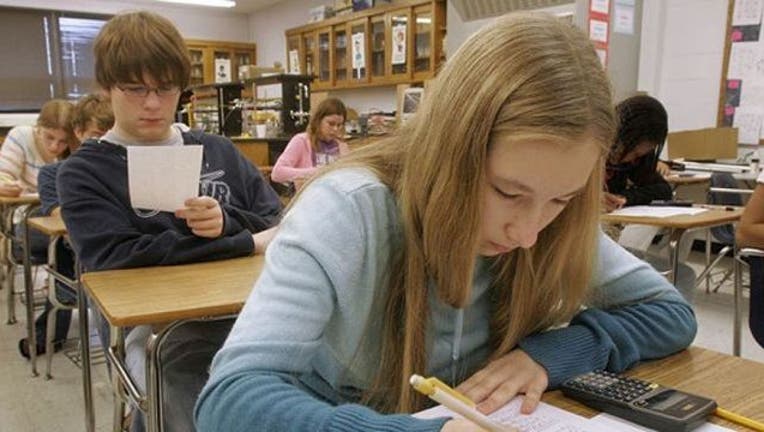Teacher strike gives 6K Illinois kids month off from school

EAST ST. LOUIS, Ill. (AP) — Self-described computer geek Edgar Williams has a clear vision of his future: study electrical engineering at the Massachusetts Institute of Technology, or perhaps Caltech.
But at a time when the soft-spoken sophomore should be engrossed in his studies at East St. Louis High School, he has to be content with the tutoring and other help he can get for three hours a day at an Upward Bound center thanks to an ongoing teachers strike in his southern Illinois community.
"I feel mad," Williams said Tuesday. "This is just going to slow me down."
The strike began Oct. 1 after union members rejected a tentative deal between their representatives and the school district in East St. Louis, a poor black community of about 27,000 residents in southwestern Illinois that is across the Mississippi River from St. Louis.
The district, which has been under state control since 2011 because of its poor performance, says it needs to save $10 million over the next 10 years. Under the rejected deal, teachers would have received a one-time payment of $2,000 and modest raises but the amount of time it would take to reach top salary scale would have nearly doubled, to 21 years.
Negotiators met Tuesday to discuss a new offer that would reduce the amount of time to get to top-scale, but talks ended after about 10 hours without an agreement. That's bad news for a city where only 5 percent of high school ACT takers are considered ready for college and less than 20 percent of the district's more than 6,000 students — all of whom qualify for reduced-price or free lunches — meets expectations on statewide standardized tests.
"I feel unappreciated," said LaTonya Sain, 33, a five-year employee who teaches ninth and 10th-grade English at East St. Louis High. "I know how hard I work. We're ready to get back to school, but we want to be treated fair."
In an open letter, Superintendent Arthur Culver said the district has to avoid a "short-term solution and create a long-term problem."
"Although we have bargained in good faith, we can only offer a contract that the district can financially sustain," he said. Kelli Hawkins, a district spokeswoman, said Culver wasn't available for an interview Tuesday because he was taking part in the negotiations.
Barbara Sams, who has been helping oversee Upward Bound's school-day curriculum during the teacher strike, said her center, which is one of several groups offering programs for displaced East St. Louis students, is drawing only a fraction of the kids who would benefit from the center's computer labs, guest lectures and free meals.
For every student like Williams and classmate Montez Holton, who wants to be a pediatric surgeon, many more have been left to hang out with their friends, care for younger siblings or play video games at home.
Some aren't waiting for a resolution and have decided to move or transfer to other districts. Nearly 50 had done so as of Sunday, Hawkins said.
It's not just the schools that are feeling a cash crunch in East St. Louis, where 98 percent of residents are black, nearly half of residents live below the federal poverty line and the average household income is just over $19,000 per year.
The city faces a budget shortfall of almost $6 million, primarily due to declining revenue from a riverfront casino, a top employer, and the city manager has proposed laying off two dozen police officers and firefighters.
Mayor Emeka Jackson-Hicks, who opposes that plan, recently pleaded with the teachers "to put the needs of our children first by seeking a reasonable compromise so that our children suffer no longer."
"The city is in a financial crisis," Jackson-Hicks said.
The East St. Louis High Flyers' football team — a seven-time state champion and one of the city's few sources of community pride — had to forfeit its final four games because of the strike, ending its 15-year streak of state playoff appearances.
Martha Young, 79, is a former East St. Louis school board member who put six children and 10 grandchildren through the city school system, along with 10 great-grandchildren. She remains hopeful that the two sides will soon reach an agreement — and that her resilient hometown will endure through its latest challenge.
"This is a strong community," she said. "Beat us down, we get back up. We might be down, but we're not out."
___
Follow Alan Scher Zagier on Twitter at http://twitter.com/azagier

